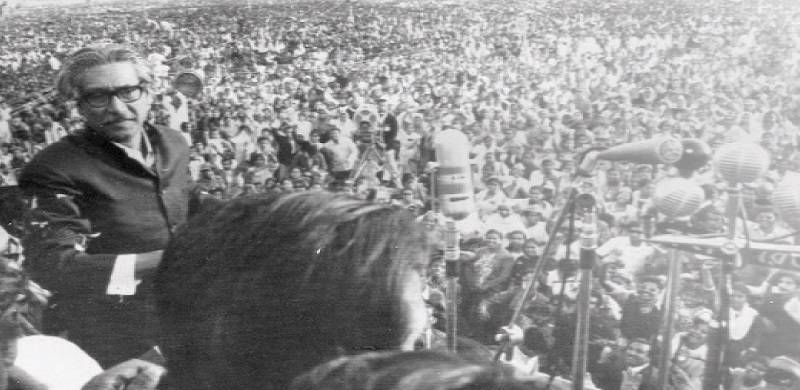
Today marks the 50th anniversary of the fall of Dhaka, an event that continues to haunt our memory as a nation. Half a century has passed since the 1971 Indo-Pak war that culminated in the separation of Pakistan’s eastern wing and the formation of the state of Bangladesh.
December 16, 1971 remains the most tragic part of our history. However, a vast majority of the population remains oblivious to how the events unfolded in the lead-up to the fateful day. Thanks to the state’s policy of suppressing and manipulating history and narratives, many questions about the tragedy remained unanswered and several facts hidden.
The Friday Times asked journalists and activists to share a fact about the fall of Dhaka that they were unaware of growing up.
Human rights activist and commentator Marvi Sirmed admitted that growing up she was a victim of the false narrative of history which had surrounded the fall of Dhaka. She said that it was very late in her student life that she became aware of the finer details of how violence was used as a tool against the Bengali people by the elites of West Pakistan.
Sirmed added that initially, she had no idea about how ‘terrorist organizations, such as Al-Badr and Al-Shams, were carved out of the Jamaat-e-Islami and supported to perpetuate violence in East Pakistan. She said that it was in response to the brutality unleashed by these organizations that Mukti Bani was created by India. Sirmed recalls how for a very long time, she was unaware of the violence unleashed against women during the war and how rape was used as a tool to suppress resistance.
Journalist and filmmaker Beena Sarwar said that she was ‘shocked’ to learn, only a few years ago, that many Bengalis had been kept in camps in Pakistan. She said that she came to learn about this astounding fact through an essay in an anthology, Beyond Borders, in which a Bengali had written how her entire family, including her father who was a Pakistan Air Force pilot, were shipped off to a camp near Peshawar.
Author Yasir Latif Hamdani said that he had grown up believing that Sheik Mujibur Rahman was a traitor who wanted an independent Bangladesh at any cost. He added that over time he realised that all Mujib was asking for was a faithful implementation of the Lahore resolution. Hamdani lamented that had better sense prevailed, Pakistan would still have been united.
Editor TFT Raza Rumi said that during his visit to Bangladesh he visited the Geneva camp where thousands of stranded Biharis live. "Their plight was heart wrenching. Not accepted by Bangladeshis and abandoned by Pakistanis, this community deserves its due."
December 16, 1971 remains the most tragic part of our history. However, a vast majority of the population remains oblivious to how the events unfolded in the lead-up to the fateful day. Thanks to the state’s policy of suppressing and manipulating history and narratives, many questions about the tragedy remained unanswered and several facts hidden.
The Friday Times asked journalists and activists to share a fact about the fall of Dhaka that they were unaware of growing up.
Human rights activist and commentator Marvi Sirmed admitted that growing up she was a victim of the false narrative of history which had surrounded the fall of Dhaka. She said that it was very late in her student life that she became aware of the finer details of how violence was used as a tool against the Bengali people by the elites of West Pakistan.
Sirmed added that initially, she had no idea about how ‘terrorist organizations, such as Al-Badr and Al-Shams, were carved out of the Jamaat-e-Islami and supported to perpetuate violence in East Pakistan. She said that it was in response to the brutality unleashed by these organizations that Mukti Bani was created by India. Sirmed recalls how for a very long time, she was unaware of the violence unleashed against women during the war and how rape was used as a tool to suppress resistance.
Journalist and filmmaker Beena Sarwar said that she was ‘shocked’ to learn, only a few years ago, that many Bengalis had been kept in camps in Pakistan. She said that she came to learn about this astounding fact through an essay in an anthology, Beyond Borders, in which a Bengali had written how her entire family, including her father who was a Pakistan Air Force pilot, were shipped off to a camp near Peshawar.
Author Yasir Latif Hamdani said that he had grown up believing that Sheik Mujibur Rahman was a traitor who wanted an independent Bangladesh at any cost. He added that over time he realised that all Mujib was asking for was a faithful implementation of the Lahore resolution. Hamdani lamented that had better sense prevailed, Pakistan would still have been united.
Editor TFT Raza Rumi said that during his visit to Bangladesh he visited the Geneva camp where thousands of stranded Biharis live. "Their plight was heart wrenching. Not accepted by Bangladeshis and abandoned by Pakistanis, this community deserves its due."

